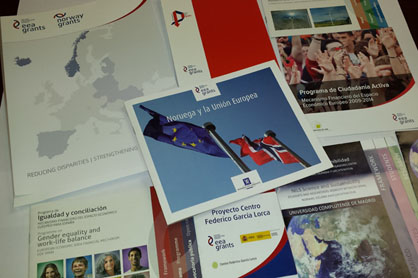More than 400 projects to reduce disparities and strengthen cooperation
 2015 has started with more than 400 projects approved and financed in Spain by the Norway, Iceland and Liechtenstein funds, but the number of beneficiaries is much higher.
2015 has started with more than 400 projects approved and financed in Spain by the Norway, Iceland and Liechtenstein funds, but the number of beneficiaries is much higher.
15.01.2015
Entrepreneurs as Eugenia or Patricia; top women managers in Renault, Indra or Coca-Cola; SMEs like Qualitas, Wairbut or corporate giants as FCC or Ibedrola; 400 students and researchers from the main Spanish Universities; NGOs and small cultural associations. All of them have one thing in common: they are beneficiaries of the funds within the Financial Mechanism of the European Economic Area (EEA Grants). But there are many more.
Within the EEA Grants framework, there are more than 400 projects all over Spain, in six different areas, financed by 42 million euros, which are already showing positive results:
-174 Spanish companies’ research projects in renewable, environment, energy efficiency or climate change fields.
-More than 120 NGOs joined in 38 projects to strengthen their crucial work with the most vulnerable.
-72 projects to foster female entrepreneurship, to promote women to decision-making positions or to fight against gender-based violence.
-30 projects to promote contemporary culture and to protect cultural heritage.
-256 Spanish students granted in Norway, Iceland and Liechtenstein Universities.
-150 Spanish researchers working together with Nordic colleagues in such fields as medicine or biotechnology.
These projects, the visible face of the EEA Grants in Spain, should finish before 31 December 2015. However, their effects is likely to continue, especially because of the bonds created among Spanish companies and institutions and those from Norway, Iceland and Liechtenstein.
The EEA Grants are the Norwegian, Icelandic and Liechtenstein contribution to the European development within the framework of the agreement with the EU by which the common market is shared but also values and objectives: reducing economic and social disparities in Europe and strengthening bilateral cooperation.